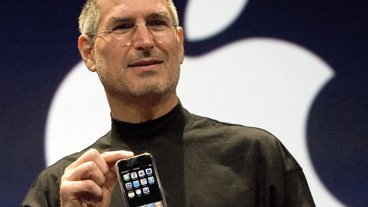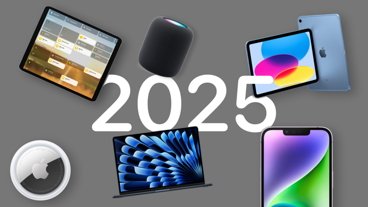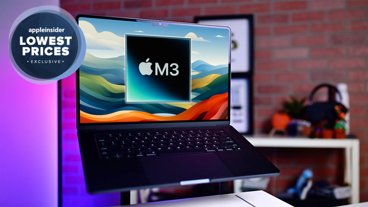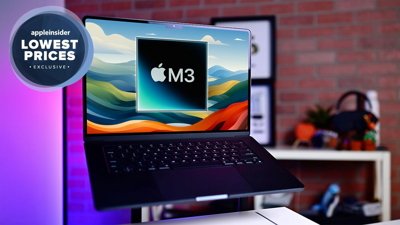Back in May of 2006, the analyst issued a similar report with comments on more than 20 questions about the Cupertino, Calif.-based company that had been lingering in the minds of investors and enthusiasts. He later followed up by addressing 16 more questions that november.
The latest report addresses a broad spectrum of questions, ranging from Munster's take on the iPhone hardware roadmap to Apple's international retail expansion.
Both the questions and answers are being republished in full in order to offer readers the full benefit of the analyst's insight:
Questions on General Business Operations:
Will Apple alter its pricing strategy?
Apple sells its products at the full MSRP 364 days a year (with one exception on Black Friday). And because its products can garner a premium, we do not expect Apple to alter its stance towards relatively higher prices. From time to time Apple will lower prices to drive demand, as we have seen with the 2/19 shuffle price cut to $49 from $79, and the recent price actions taken in Europe with the iPhone. For more on iPhone pricing, see below. It's important to note, Apple legally can not influence the retail price of its products sold through 3rd parties. Talk that Apple has broad pricing control are false.
How does Apple approach the Enterprise business?
In the past, Apple has indicated that at its core, it is a consumer company. We believe this is still true; however, we believe Apple is slightly changing its perspective on selling to the Enterprise. The recent iPhone software announcements with Exchange support and other enterprise solutions provide Apple with a foot in the door. In fact, 1/3 of all Fortune 500 companies have approached Apple with interest in the iPhone Enterprise Beta program. While Apple will let consumer demand drive the product decisions it makes, the company recognizes that every consumer is likely PC user at work, and we expect the company to focus on improving its outreach to Enterprise users. Overall, we see this as a slight change, and we expect Apple to remain singularly focused on the consumer segment.
Will Apple TV become a full 4th cylinder business, or will it remain a hobby?
Currently, the Apple TV represents a very small part of Apple's overall business. In fact, Steve Jobs refers to it as a "hobby", rather than a complete fourth cylinder of Apple's strategy (along with iPod, iPhone, and Mac). During Macworld, the company acknowledged that it did not get the Apple TV right the first time around. But we believe Apple is more confident in the business after the recently updated software update, internally dubbed "Take 2". Widespread adoption of the product is limited by the need for a broadband internet connection and a widescreen TV, but the movie rentals offering is becoming increasingly robust, and we believe Apple intends to continue innovating on the Apple TV platform. That said, our expectations for the Apple TV business remain conservative.
Mac Related Questions:
Why did Apple stop selling a $999 iMac?
When Apple last redesigned the iMac, in Aug-07, the company dropped the 17" model at the $999 price point. We believe the company ended shipping the 17" iMac simply because it was not selling as well as the 20" model. And it is likely that the company increased the margins on the iMacs by reducing the amount of SKUs in the lineup, particularly with the elimination of an entire screen and form factor size.
How is Mac growth in the education market relative to overall Mac growth?
We believe Apple's growth in the education markets is outpacing its overall Mac growth. And this is significant considering Mac units grew 51% y/y in the March quarter. Specifically, we believe higher ed has been growing significantly faster for Apple than overall Mac units, and the K-12 business has also been a key driver.
What are the key selling points of a Mac?
Mac market share is rising, and we believe consumers are choosing to buy Macs for four reasons: 1) Apple offers unique, eye-catching hardware, 2) Apple's OSX is widely understood to be more secure and stable than Windows, 3) The iLife suite (iTunes, iPhoto, iMovie, etc.) attracts users who are looking for a digital lifestyle solution, 4) Apple has worked to improve the Mac buying experience, especially in its retail stores.
How is Apple approaching Multi-Touch?
We believe the Multi-Touch gestures recently added to the MacBook Air and MacBook Pro are just the beginning of Apple's exploration of Multi-Touch on the Mac. Apple is clearly leveraging its technology portfolio from the iPhone to improve the Mac experience as well, and we believe Apple will continue to add Multi-Touch gestures to its notebooks. Currently, these gestures require the same touch-sensing technology used in the iPhone, but they use a traditional looking trackpad. Eventually, we expect Apple to change the trackpad to backlit color screens for a more dynamic user interface on the Mac. And ultimately, we expect Apple to develop a full touch-screen MacBook, although not until the technology has fully matured over the next 3-5 years. We believe Multi-Touch is a core differentiator of Apple products (relative to other touchscreen devices), and Apple has adequately protected its innovations in order to maintain a leading edge in the touchscreen device categories (phones, portable computing devices like the iPod touch, and Mac notebooks).
How serious is Apple about the enterprise opportunity for the Mac?
When we talk about building products, it's a consumer focus. Choices that favor a consumer and the purchasing behavior of a consumer.Businesses are looking at Mac and its great technology regardless. Could pushing enterprise opportunity hurt the consumer biz? Maybe, there are concerns. We believe that they will always focus on driving the product forward. It's Apple's DNA. Driving forward – not hesitant to eat their young.
In the coming years, how will people use their Macs in ways they aren't today?
In addition to significant advancements in touchscreen features, we expect Apple to continue to invest in the digital lifestyle trend. From the beginning, Apple has led the way with its iLife suite of applications for digital music, movies, and photos. We believe this focus will be primarily driven by software, with periodic updates to the iLife suite. Additionally, we believe that devices in Apple's entertainment ecosystem like the iPod and Apple TV will augment the digital lifestyle trend on the Mac side. The integration between the elements of the ecosystem is a critical piece of the Mac growth, from the Halo Effect of those devices.
On page 2 of 2: What is the iPhone's hardware roadmap?; How is the price a carrier charges for the iPhone set?; What was the driver for the App Store on the iPhone for 3rd party applications?; Is the iPhone cannibalizing iPod sales?; What did Apple management mean when it referred to the iPod as a "Wi-Fi mobile platform"?; How are the Apple stores performing as a business segment?; and What are Apple's plans for international expansion?.
iPhone Related Questions:
What is the iPhone's hardware roadmap?
We continue to expect Apple to offer a family of iPhones (2-3 separate models) in the first half of 2009, including lower priced ($200-$300) models. Just as the company slowly diversified the iPod lineup and entered lower price points with every new version of the iPod, we expect Apple to launch new models of the iPhone at lower price points in CY09. This expectation, along with the expectation for lower price points, and world wide availability of the phone, is critical to our CY09 iPhone estimate of 45m units.
How is the price a carrier charges for the iPhone set?
Although Apple is able to garner a premium price for its devices, we believe its carrier partners are free to price the device at their discretion. In fact, when Apple's carrier partner in the UK, O2, lowered the price of the 8GB iPhone by £100, the price of the same device on Apple's UK Web-based store remained at the original, higher price. We believe one reason why wireless carriers were eager to sell the iPhone is that Apple can maintain a higher ASP; however Apple has made it clear that they are not hesitant to explore alternate pricing schemes. For example, the company is currently exploring a subsidized model in Germany with an 8GB phone going for as low as €99. Furthermore, we believe Apple is not hesitant to try business models other than the exclusive models the company has chosen during the iPhone's first year. It has enabled Apple to maintain tight control on the user experience of the iPhone, but expanded availability will likely become a higher priority, and we believe it will eventually drive Apple to offer the iPhone on multiple carriers in each country.
What was the driver for the App Store on the iPhone for 3rd party applications?
The thriving iPhone hacking community adequately showed that there was significant demand for features the iPhone is capable of, but Apple is not offering. Games, instant messaging, and industry-specific applications are several examples of features that the iPhone does not currently offer in a native application setting. We believe Apple recognized that its user base was dissatisfied with the simplified Web 2.0 apps available on the iPhone's web browser; as a result, the company announced the availability of 3rd party applications in March along with the iPhone operating system 2.0, which is on track to arrive in late June.
iPod Related Questions:
Is the iPhone cannibalizing iPod sales?
We believe that there is some degree of iPod cannibalization due to the iPhone, but the impact is difficult to measure. In general, it is clear that iPod growth is slowing, but we believe that Apple will counteract the maturity in the iPod market with innovative new touchscreen iPods at lower price points. Additionally, Apple is well positioned to upsell its users from lower priced iPods to more expensive iPhones, in which case the cannibalization of iPod sales is a net positive to the company.
What did Apple management mean when it referred to the iPod as a "Wi-Fi mobile platform"?
History has shown that iPod growth is largely tied to: 1) the holiday shopping season and 2) innovative iPods. During the Dec-07 conference call, management referred to the iPod touch as the beginning of a "mainstream Wi-Fi mobile platform." We believe that the iPod touch is the first of several Internet-connected iPods that Apple is currently developing. Internet connectivity enables applications like email and a web browser to add significant value to the iPod lineup, which will drive incremental growth and spur the replacement cycle for current iPod owners. With 70% market share, we believe Apple is positioned to transform the MP3 market into a portable computing market. And with the addition of the iPhone and iPod touch SDK, along with a robust and growing developer community working with the beta, Apple is well positioned to expand its iPod user base into the mobile computing category.
Questions On Apple's Retail Stores:
How are the Apple stores performing as a business segment?
Simply put, we believe its retail stores are one of Apple's most underappreciated business segments. Despite talk of a retail recession, revenue from all retail stores rose to $1.45b in March, up 75% y/y in total. Additionally, the average store revenue (not comparable stores, but an average of all stores) grew 48% to 7.1m in the quarter. Finally, Mac sales grew to 458k units in the March quarter, or 20% of all Macs sold, despite the fact that the 200+ retail stores account for just 2% of the ~10,000 Mac points of sale.
What are Apple's plans for international expansion?
The concentration of Apple retail stores reflect Apple's strongest markets. Clearly, the US is Apple's strongest market, and it also has the most Apple retail stores. The UK is second, with 15 stores, and it is Apple's second largest market. We expect Apple to capitalize on this market with more stores in the UK. According to the relationship between Apple's business in a country and the amount of retail stores, Canada is slightly behind on the retail front, and we expect the company to add stores in Canada in the near future. We also expect the company to launch a store in Beijing, China before the Olympic games (around the July '08 timeframe). In other words, we expect Apple to lead with its retail stores into the Chinese market, which represents a large opportunity for the company. This would not only provide a significant point of sale for Macs in the country, but it would also establish a center for iPhone sales and marketing for an iPhone launch in the country (which we expect some time in 2009).
 AppleInsider Staff
AppleInsider Staff






-m.jpg)






 Chip Loder
Chip Loder
 Marko Zivkovic
Marko Zivkovic
 Malcolm Owen
Malcolm Owen
 Christine McKee
Christine McKee

 Sponsored Content
Sponsored Content










37 Comments
No way did apple go ahead with the app store due to 'the hacker community' these products and there strategies are thought out 2 or more years before their release, apple just had a lot on their plate getting the iphone out the gate and also love to keep things current and in the news in this staggered approach. The SDK was being worked on before the iphones release.
No way did apple go ahead with the app store due to 'the hacker community' these products and there strategies are thought out 2 or more years before their release, apple just had a lot on their plate getting the iphone out the gate and also love to keep things current and in the news in this staggered approach. The SDK was being worked on before the iphones release.
Is that how you know? I'm guessing it's a bit of both. They planned ahead, and if there was demand--which there was--they would release the SDK. If everyone was more than happy with web apps, why spend the resources on building and maintining an SDK?
It's Apple's DNA. Driving forward ? not hesitant to eat their young.
[ View this article at AppleInsider.com ]
Wrong metaphor. Apple is not hesitant to discard their old. To make way for their young.
How does Apple approach the Enterprise business?
In the past, Apple has indicated that at its core, it is a consumer company. We believe this is still true; however, we believe Apple is slightly changing its perspective on selling to the Enterprise. The recent iPhone software announcements with Exchange support and other enterprise solutions provide Apple with a foot in the door. In fact, 1/3 of all Fortune 500 companies have approached Apple with interest in the iPhone Enterprise Beta program. While Apple will let consumer demand drive the product decisions it makes, the company recognizes that every consumer is likely PC user at work, and we expect the company to focus on improving its outreach to Enterprise users. Overall, we see this as a slight change, and we expect Apple to remain singularly focused on the consumer segment.What are the key selling points of a Mac?
Mac market share is rising, and we believe consumers are choosing to buy Macs for four reasons: 1) Apple offers unique, eye-catching hardware, 2) Apple's OSX is widely understood to be more secure and stable than Windows, 3) The iLife suite (iTunes, iPhoto, iMovie, etc.) attracts users who are looking for a digital lifestyle solution, 4) Apple has worked to improve the Mac buying experience, especially in its retail stores.
2009).
[ View this article at AppleInsider.com ]
Apple will clearly chase the Enterprise market, but all in good time. it is doing exceedingly well in the consumer market and the education market, these are both computer buying niches that Apple owns by deliberately targeting such customers. meanwhile, every other PC manufacturer has been targeting business users. Apple was smart to target different segments.
The key to Apple's success is its key selling points which i see a little different from PJ's.
Apple's core positioning is: "Computers that are easy to use out of the box."
The quality and aesthetics are important, but are not the key factor driving improved performance. Apple has always delivered great looking computers, what has made the crucial difference is the operating system: OSX.
When Tiger arrived together with Intel processors, we saw a quantum leap in reliability that enhanced ease of use. These are the two factors that have most delivered financial results for Apple. OS 10.5 simply builds on a great foundation as does better and better designs.
While OS10 has got better, Microsoft truly dropped the ball with Windows Vista. In doing so they gave people who might have otherwise stuck it out with the PC platform the impetus to try a Mac.
While macs are relatively virus free, this is primarily due to the fact that not many hackers are bothering to write Mac viruses. macs are not immune to viruses and with growing market share it ma only be a matter of time before we see a major virus hit Macs. Most people buying macs are smart enough to realize this, but in truth buying a Mac only means you don't really need to buy Norton AV anymore.
To re-state then, Apple's core positioning is all about the user experience: the interface between man and machine. Be it a Mac, an iPod or an IPhone, all of its hardware and software is focused around making the tasks they were designed to fulfill easier, faster and more of a no-brainer to complete.
The sheer functionality Apple Macs deliver make them an ideal productivity tool for an office environment. I am sure it is only a matter of time before we see OSX Pro with more security features and less leisure-based applications targeted directly at large organizations. Even without it, we're already seeing major corporate migrations to the Mac platform. From my own company's perspective, Office 2008 for the Mac offers a better user-experience than the PC version Office 2007, with one exception, the lack of Macro support in Excel. (Which i think was a deliberately left out just in case a trickle of Windows defectors becomes a flood.)
Apple is doing so many things right, it is an object lesson in marketing for just about any other major business. In particular, a fact that PJ to my surprise did manage to identify correctly was the quality of the buying experience. In fact, the entire experience offered by Apple is superb. The web, with cool little movies that provide heaps of relevant product info, the in-store environment, helpful staff who know their stuff, the product packaging, warranties, third-party products, satisfied users sharing tips and the whole Mac aficionado fan base all support the experience. mac isn't just a product, it's a religion.
Perhaps that's overstating it, but Apple has created a corporate philosophy and culture that it adheres to consistently and it shows. When you truly put customer satisfaction before profit, profits flow abundantly. This is something that many other consumer products manufacturers would do well to take note of.
When people see great companies producing great products, they get behind them and champion them. Perhaps that's the strongest reason of all to understand why Apple commands a price premium as well as loyalty.
My brother is a financial analyst with Western-Southern. He says that the only person they listen to regarding all things Apple is Gene Munster. He is the only one who has been consistently correct and "gets it".